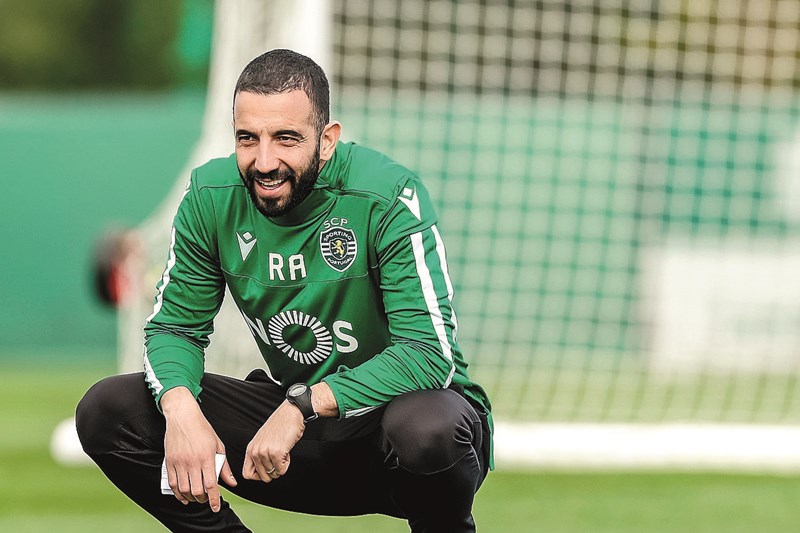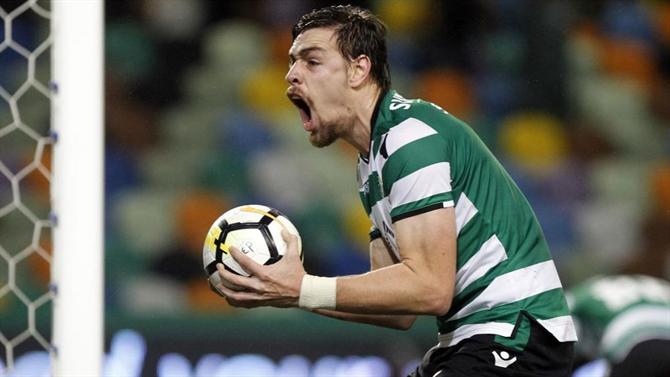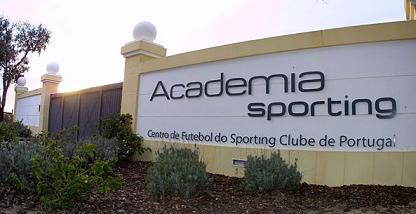 Rúben Amorim, Rúben Amorim, Rúben Amorim… We could simply write the name of the Sporting coach ten times, such has been his overarching influence in the conquest of Sporting’s first Portuguese League triumph in 19 years.
Rúben Amorim, Rúben Amorim, Rúben Amorim… We could simply write the name of the Sporting coach ten times, such has been his overarching influence in the conquest of Sporting’s first Portuguese League triumph in 19 years.
However, to finish top of the pile at the end of a gruelling season requires a team effort, on and off the pitch. PortuGOAL outlines 10 reasons why Sporting are celebrating being crowned 2020/21 Primeira Liga champions.
Joined-up thinking
Chaotic planning (or no planning at all) was the overriding feature of Sporting’s 2019/20 season. The first team was coached by four different managers, squad recruitment proved disastrous with flop after flop (Jesé Rodríguez, Yannick Bolasi, Eduardo Henrique, Valentin Rosier…) and it was little surprise that the Lions finished in 4th place, a massive 22 points behind champions FC Porto.
To the club’s credit, lessons were learned. Rúben Amorim arrived 10 matches from end of the season and the coach used those matches to a) implement his 3-4-3 tactical model and b) evaluate which players fitted the system and which pieces were missing. Then, in the summer transfer window, Amorim, together with football director Hugo Viana, got busy recruiting players with the exact profile needed to fit the system. The result? Sporting’s new signings ahead of 2020/21 could not have contrasted more with the previous season. Instead of flop after flop, it was hit after hit, with the likes of Antonio Adán, Pedro Porro, Zouhair Feddal, Pedro Gonçalves and Nuno Santos all key contributors to the success.
Captain Fantastic – Sebastián Coates
 Seba Coates has been simply unrecognisable this season. The beanpole centre-back has always been a popular figure at Alvalade thanks to his wholehearted attitude, but it is no less true that the Uruguayan was prone to misfortune and mishaps with own goals and red cards frequently featuring next to his name on team-sheets at the end of the match.
Seba Coates has been simply unrecognisable this season. The beanpole centre-back has always been a popular figure at Alvalade thanks to his wholehearted attitude, but it is no less true that the Uruguayan was prone to misfortune and mishaps with own goals and red cards frequently featuring next to his name on team-sheets at the end of the match.
Coates has been the player who has most benefited from the change in system, with his lack of pace covered by a 5-man defence and speedy wing-backs. Instead, it is Coates’ strong points that have come to the fore. His dominance in the air at both ends of the pitch, his superbly timed last-ditch interceptions, blocks, tackles, his accurate and penetrative long-range passing and above all his leadership qualities have stood out to such an extent that he is a strong shout for Player of the Season in the entire league.
Healthy mix of experience and youth
Much has been made of this “young Sporting team” in the media, but the expression is something of a misnomer. 30-year-old captain Sebastián Coates, Adán (33), Feddal (31) and Luís Neto (32) comprise the solid foundation on which the team is built, while players such as João Mário (28), João Palhinha (25) and Nuno Santos (26) are fully matured footballers in their prime. While it is true that a handful of brilliant youngsters have been key components of the team, it is more accurate to say the team benefits from a combination of experience and knowhow brought by mature footballers balanced with the energy and irreverence brought by players starting out in their professional careers.
Young Gems
 Although a well-rounded squad in terms of its age-profile, as alluded to above, it is undeniable that Sporting’s young home-grown talent has played a vital part in the success. Starting last season, Rúben Amorim promised part of his mission would be to give Sporting Clube de Portugal’s famous Alcochete Academy a leading role in the make-up of the first team. This season he has stuck to that policy and the result has been nothing short of spectacular in terms of nurturing stars of the future.
Although a well-rounded squad in terms of its age-profile, as alluded to above, it is undeniable that Sporting’s young home-grown talent has played a vital part in the success. Starting last season, Rúben Amorim promised part of his mission would be to give Sporting Clube de Portugal’s famous Alcochete Academy a leading role in the make-up of the first team. This season he has stuck to that policy and the result has been nothing short of spectacular in terms of nurturing stars of the future.
Academy products Nuno Mendes, Gonçalo Inácio, Daniel Bragança, Jovane Cabral and Tiago Tomás – in addition to Pedro Gonçalves (Pote) and Pedro Porro – all 22 years old or younger, are incomparably more developed and more valuable players than they were a year ago. And with the confidence afforded by being able to boast a league championship winners medal at such a young age, they are likely to only get better. So impressive have been the contributions made by Nuno Mendes and Pote in particular, that the big question is whether Sporting can keep hold of them or if they will be sold to a club in a higher profile league… but that’s a question for another day.
‘Thou Shalt Not Pass’ – Rock-solid defence
“Forwards win games, defence wins championships”, so the saying goes, and that has proven to be the case with Sporting this season. Sporting do not boast the attacking firepower of their main rivals, but such has been the solidity conferred by their back line, they have not needed to score a tonne of goals to win matches. The defensive statistics speak for themselves: just 20 goals conceded in 34 matches, 20 clean sheets, 12 matches won by a single goal margin.
Collective effort – squad togetherness
Sporting have become champions of Portugal with no real superstars. A clear benefit of this fact is that the whole squad feels they are part of the team. Consequently, telling contributions have been made by players coming off the bench, and squad members who have not seen many minutes on the pitch have proven reliable when called upon. The team spirit Amorim has engendered is a huge factor that explains why Sporting’s 2020/21 vintage is a classic case of the whole being stronger than the sum of its parts.
Belief right to the final whistle
No doubt intimately related to the above point is the fact that time and time again, Sporting looked on the cusp of dropping points, only to score late winners or equalisers. Herein lies the tangible outcome of an unshakeable belief that the collective effort will win through in the end, no matter what. The psychology behind winning or avoiding defeat in such circumstances should not be underestimated, both for Sporting and their opponents. While the Lions received a huge boost every time a decisive goal went in late on, their title rivals will have experienced that deflating feeling of what appeared an open door slamming shut in their faces time and again throughout 2020/21.
Update: Sporting have now earned 20 (TWENTY) points with goals after the 80th minute.
— Tom Kundert (@PortuGoal1) May 1, 2021
Porto 87' - 1pt
StaClara 81' - 2pts
Gil 82' 84 96' - 3pts
Farense 91' - 2pts
Benfica 92' - 2pts
Gil 83 91' - 3pts
Tondela 81' - 2pts
Bsad 83' 96' - 1pt
Braga 81' - 2pts
Nacional 83' 92' - 2pts https://t.co/Aw4Wqp2JaM
Low expectations – low pressure
To say expectations were low at the start of the season would be an understatement. Sporting were coming off an awful campaign, had invested little in new signings and had lost two of their best performers in feisty Argentine defender Marcos Acuña and Brazilian midfield schemer Wendel. Moreover, Benfica had splashed out over €100 million in squad reinforcements, while Porto, who had won two of the previous three championships, had also strengthened their squad. Yet the scant hopes that Sporting could mount a title challenge, even among their own fans, proved a blessing as the Lions quietly went about their work and stole into the lead at the top of the table in the first half of the season. Amorim’s intelligent communication strategy, insisting Sporting were not title contenders despite their points advantage, flagging up recent history to back up his argument (the last 18 league titles in Portugal have been won by Porto or Benfica), also helped keep the pressure off a squad of players who had never before been champions.
Presidential/boardroom stability – Silence is golden
The fact Sporting have been a long way from winning the title over most of the past two decades can be attributed to a large extent to the never-ending infighting and instability at the top level of the club. This season has seen a new approach, with hardly a word heard from president Frederico Varandas – a man not endowed with natural communication skills, it has to be said – or any or the other directors. Sporting have done their talking on the pitch, and the infighting has wilted away.
And at national level, it has made a pleasant change to see Sporting remove themselves from the usual bluster and confusion of the presidents of Portugal’s top clubs attacking one another, the referees, the football authorities and even government bodies, in short any institution or individual that is perceived as striving to harm their particular club’s chances of success.
Rúben Amorim: Sporting’s unlikely Lion King
As mentioned at the start, there is absolutely no doubt about the man who is most responsible for Sporting’s spectacular season: coach Rúben Amorim. Indeed, Amorim’s imprint can be clearly seen shot through the nine reasons listed above. His strong convictions, tactical nous, ability to foster a spirit of togetherness, and crystalline communication has injected new life into what appeared a moribund institution.
We pick out a relatively minor moment in terms of Sporting’s season as a whole, which took place on 20 March 2021, to exemplify Amorim’s courage, intelligence and innovative thinking. With ten minutes remaining in Sporting’s tense 1-0 win against Vitória de Guimarães, Amorim made a surprising substitution, handing Dário Essugo his debut in place Euro 2016 winner João Mário, less than one week after he had celebrated his 16th birthday. Sporting duly held on, with Essugo overcome with emotion and breaking down in tears at the final whistle.
As lágrimas do Leão mais jovem de sempre a estrear-se pela Equipa Principal do #SportingCP ?
— Sporting Clube de Portugal (@Sporting_CP) March 20, 2021
Que seja o primeiro de muitos, @darioessugo6! ? #MadeInSporting
? @SPORTTVPortugal pic.twitter.com/3MgScvRYTF
Was Essugo crucial in securing the three points? No. But through that calculated risk, Amorim sent out a clear message to the squad that everyone counted for him, while simultaneously keeping the usual starters on their toes, and perhaps most important of all, and excitingly for Sporting fans, hinted at a long-term plan.
“This is a sign for all young players (in Portugal) that at this club you will be given your chance, so that should be taken into account when deciding which club to join,” said Amorim, in the post-match press conference. It was a clear wink of the eye to the next generation of top Portuguese youth players by highlighting the investment in youth at Sporting in direct contrast to club policy at Benfica and FC Porto, where academy players have a far tougher time trying to break into the first team.
Little more than a year in the Alvalade hot seat, Rúben Amorim has already made history. But perhaps this is just the start.
by Tom Kundert

